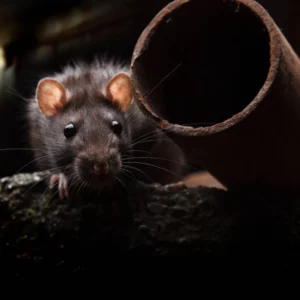
Mothballs have long been associated with deterring pests, particularly rats. With their distinct odor and chemical composition, they seem like a promising solution for keeping these rodents away from our homes. However, it's essential to separate fact from fiction when it comes to rat control methods. In this article, we will delve into the truth about mothballs and their effectiveness in deterring rats.

Before we explore the effectiveness of mothballs as rat repellents, it is crucial to understand the nature of rats and their behavior. Rats are highly adaptive creatures with a keen sense of smell. They are attracted to food sources and warm, sheltered environments. So, it makes sense to wonder if mothballs, with their strong smell, can repel these pests.
However, the truth is that rats are not deterred by the scent of mothballs. While the odor may be unpleasant to humans, rats do not perceive it in the same way. In fact, rats can tolerate a wide range of odors and are known to adapt to various repellents over time.
So, if you were hoping that mothballs alone could protect your home from rat infestations, it's time to reconsider your approach.
But fear not, there are other effective methods to keep rats away from your home.
One such method is to ensure that your surroundings are not conducive to rat infestations. Rats are attracted to areas with easily accessible food sources, so it's important to keep your kitchen and pantry clean and free of crumbs. Additionally, sealing any cracks or holes in your walls and foundation can prevent rats from entering your home in the first place.
Another effective way to deter rats is to remove any potential nesting sites. Rats are known to seek out warm and sheltered environments, such as attics, basements, and crawl spaces. By decluttering these areas and keeping them well-ventilated, you can make them less appealing to rats.
If you're still concerned about rat infestations, you may consider using traps or hiring professional pest control services. Traps can be an effective way to catch rats, but it's important to use them correctly and dispose of captured rats safely. Professional pest control services have the knowledge and expertise to identify and address rat infestations effectively.

While the scent of mothballs may not be enough to deter rats, some argue that the chemicals found in these products can have an effect on these pests. Mothballs typically contain naphthalene or paradichlorobenzene, both of which are known to repel a variety of insects.
However, when it comes to rats, the effectiveness of these chemicals is limited. Rats have a higher tolerance for such substances, making it unlikely that mothballs alone will be sufficient to keep them away. Additionally, the concentration of these chemicals needed to affect rats can be harmful to humans, leading to potential health risks.
Therefore, relying solely on mothballs as a rat control method is not recommended, as it does not provide a comprehensive solution to the problem.
Instead, it is essential to employ a multi-faceted approach to rat control. By combining different methods, such as proper sanitation practices, sealing entry points, and using traps or professional services, you can effectively manage and prevent rat infestations.
Remember, the key to successful rat control lies in understanding their behavior and implementing strategies that address their specific needs and vulnerabilities. So, don't fall for the myth of mothballs as a standalone solution and take proactive measures to keep your home rat-free.
Dealing with a rat infestation can be a frustrating and challenging task. However, with the right strategies and preventive measures, you can effectively control and deter rats from invading your home. In this article, we will explore some natural rat repellents and provide tips and tricks to rat-proof your home.
Instead of relying solely on traditional methods like mothballs, it is advisable to explore natural rat repellents that can be used in conjunction with other rat control strategies. One such repellent is peppermint oil, which has been found to deter rats due to its strong smell. Rats dislike the scent of peppermint and will avoid areas where it is present. By strategically placing cotton balls soaked in peppermint oil in areas prone to rat activity, you can create a barrier that discourages them from entering your home.
In addition to peppermint oil, ultrasonic devices have gained popularity as a rat control method. These devices emit high-frequency sound waves that are inaudible to humans but can disrupt the rodents' auditory system. This makes your home less appealing to rats, as they rely heavily on their sense of hearing. However, it is important to note that while ultrasonic devices can be effective, they should be used in conjunction with other rat control methods for optimal results.
By combining these natural repellents with other methods, such as sealing entry points and removing potential food sources, you can create a more effective rat control plan. It is crucial to adopt a comprehensive approach to ensure long-term rat control and prevent future infestations.
Prevention is always better than dealing with a rat infestation. Taking proactive measures to rat-proof your home can save you time, money, and frustration in the long run. Here are some tips and tricks to help you keep rats at bay:
1. Seal Entry Points: Rats can squeeze through small gaps and cracks, so it is vital to seal any potential entry points in your walls, foundation, or roof. Inspect your home thoroughly and use materials like caulk, steel wool, or wire mesh to block any openings that rats could exploit.

2. Keep Your Home Clean: Rats are attracted to food sources, so it is essential to keep your indoor and outdoor spaces clean and free of food debris. Regularly sweep and mop floors, clean countertops, and properly store food in sealed containers. Additionally, ensure that your garbage bins have tight-fitting lids to prevent rats from accessing them.
3. Trim Vegetation: Rats are excellent climbers and can use tree branches or overgrown vegetation to gain access to your home. Trim tree branches that are close to your house and keep shrubs and bushes well-maintained to eliminate potential entry points.
4. Regular Inspections: Conduct regular inspections of your property to identify any signs of rat activity. Look for droppings, gnaw marks, or chewed wires, as these are indications of a rat presence. If you notice any signs, take prompt action to address the issue before it escalates into a full-blown infestation.
By implementing these rat-proofing tips and tricks, you can significantly reduce the risk of a rat infestation and protect your home from these unwanted pests. Remember, prevention and early intervention are key to long-term rat control.
While there are preventive measures and DIY rat control methods available, certain situations may call for professional assistance. If you notice persistent rat activity, such as droppings, gnawed wires, or unusual noises, it may indicate a larger infestation that requires professional attention. Rats are known to reproduce rapidly, with a single female rat capable of giving birth to up to 12 offspring every three weeks. This means that a small rat problem can quickly escalate into a major infestation if not addressed promptly.
Additionally, if your attempts at rat control have been unsuccessful, it's best to seek the expertise of a rat removal specialist. Rats are highly adaptable creatures and can find ways to evade traps and other DIY methods. Professional rat removal services have the knowledge, experience, and tools to effectively eliminate rat infestations and implement long-term preventive measures.
Rats are not only a nuisance but also pose serious health risks. They can carry various diseases, including leptospirosis, hantavirus, and salmonellosis. These diseases can be transmitted to humans through contact with rat droppings, urine, or saliva. Therefore, it is crucial to address a rat infestation promptly and effectively to protect the health and well-being of your family.
When selecting a rat exterminator, it is essential to consider their expertise, reputation, and approach to rat control. Look for professionals who prioritize humane techniques and have a thorough understanding of rat behavior. A reputable rat removal specialist will conduct a thorough inspection of your property to identify entry points and potential nesting areas.
It's also a good idea to inquire about their methodology, including the use of environmentally friendly products and long-term preventive strategies. Some rat exterminators employ integrated pest management (IPM) techniques, which focus on minimizing the use of chemical pesticides and instead emphasize prevention, exclusion, and non-toxic control methods.
By choosing the right rat exterminator, you can ensure that your rat problem is efficiently resolved while maintaining the well-being of both your home and the surrounding environment. A professional rat removal service will not only eliminate the existing infestation but also provide recommendations for preventing future rat problems, such as sealing entry points, removing food sources, and implementing proper sanitation practices.
In conclusion, while there are various DIY rat control methods available, certain situations call for professional rat removal services. If you notice persistent rat activity or have been unsuccessful in your attempts to control the infestation, it's best to seek the expertise of a rat removal specialist. By choosing the right professional, you can effectively eliminate the rat infestation, protect your health, and prevent future rat problems. Remember, when it comes to rat control, it's better to be proactive and seek professional assistance sooner rather than later.